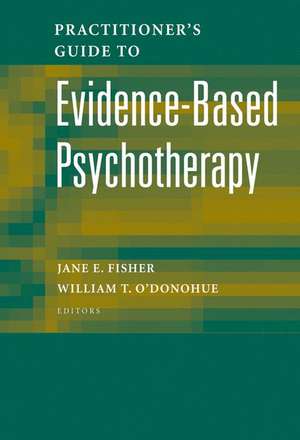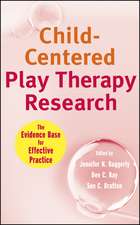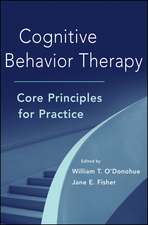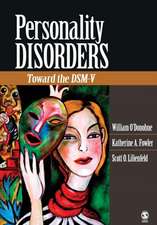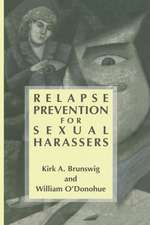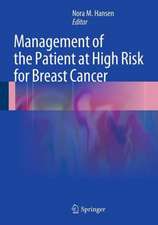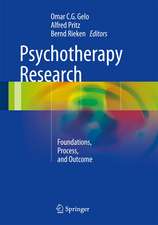Practitioner's Guide to Evidence-Based Psychotherapy
Editat de Jane E. Fisher, William O'Donohueen Limba Engleză Hardback – 26 iul 2006
Designed to bring ready answers from scientific data to real life practice, The guide is an accessible, authoritative reference for today’s clinician. There are solid guidelines for what to rule out, what works, what doesn’t work and what can be improved for a wide range of mental health problems. It is organized alphabetically for quick reference and distills vast amounts of proven knowledge and strategies into a user friendly, hands-on reference.
| Toate formatele și edițiile | Preț | Express |
|---|---|---|
| Paperback (1) | 814.46 lei 43-57 zile | |
| Springer Us – 28 oct 2010 | 814.46 lei 43-57 zile | |
| Hardback (1) | 1135.91 lei 43-57 zile | |
| Springer Us – 26 iul 2006 | 1135.91 lei 43-57 zile |
Preț: 1135.91 lei
Preț vechi: 1195.70 lei
-5% Nou
Puncte Express: 1704
Preț estimativ în valută:
217.36€ • 227.51$ • 180.91£
217.36€ • 227.51$ • 180.91£
Carte tipărită la comandă
Livrare economică 31 martie-14 aprilie
Preluare comenzi: 021 569.72.76
Specificații
ISBN-13: 9780387283692
ISBN-10: 0387283692
Pagini: 754
Ilustrații: VI, 754 p.
Dimensiuni: 178 x 254 x 38 mm
Greutate: 1.45 kg
Ediția:2006
Editura: Springer Us
Colecția Springer
Locul publicării:New York, NY, United States
ISBN-10: 0387283692
Pagini: 754
Ilustrații: VI, 754 p.
Dimensiuni: 178 x 254 x 38 mm
Greutate: 1.45 kg
Ediția:2006
Editura: Springer Us
Colecția Springer
Locul publicării:New York, NY, United States
Public țintă
Professional/practitionerDescriere
I haven’t seen this disorder in ages—what’s the latest treatment?
What measures are most useful in assessing this problem?
Her coverage allows so few visits—can we get anything done?
Are there any useful self help materials or websites?
How do I know this will work?
Designed to bring ready answers from scientific data to real life practice, The Practitioner’s Guide to Evidence-Based Psychotherapy is an accessible, authoritative reference for today’s clinician.
The Guide, organized alphabetically for quick reference, distills vast amounts of proven knowledge and strategies (across the lifespan as well as across the DSM) into a user friendly, hands-on reference. Chapters are written by leading experts, focusing on appropriate assessment and empirically supported therapies. Here are solid guidelines for what to rule out, what works, what doesn’t work and what can be improved for a wide range of mental health problems, including:
- ADHD, learning disabilities, autism spectrum disorders
- Bedwetting, feeding disorders, school refusal, thumb sucking
- Bipolar disorder, obsessive-compulsive disorder, PTSD
- Child abuse and domestic violence
- Dysthymia, depression, suicidal thoughts
- Erectile and orgasmic disorders
- Smoking, gambling, substance abuse
- Stress, chronic pain, insomnia
Developed with the frontline clinician’s time and cost constraints firmly in mind, the Practitioner’s Guide to Evidence-Based Psychotherapy allows readers to understand the best assessment and treatment options. This resource is designed to help clinical psychologists, clinical social workers, psychiatrists and counselors achieve the maximum in service to their clients. Concise and up-to-date, it also serves as an excellent student guide.
What measures are most useful in assessing this problem?
Her coverage allows so few visits—can we get anything done?
Are there any useful self help materials or websites?
How do I know this will work?
Designed to bring ready answers from scientific data to real life practice, The Practitioner’s Guide to Evidence-Based Psychotherapy is an accessible, authoritative reference for today’s clinician.
The Guide, organized alphabetically for quick reference, distills vast amounts of proven knowledge and strategies (across the lifespan as well as across the DSM) into a user friendly, hands-on reference. Chapters are written by leading experts, focusing on appropriate assessment and empirically supported therapies. Here are solid guidelines for what to rule out, what works, what doesn’t work and what can be improved for a wide range of mental health problems, including:
- ADHD, learning disabilities, autism spectrum disorders
- Bedwetting, feeding disorders, school refusal, thumb sucking
- Bipolar disorder, obsessive-compulsive disorder, PTSD
- Child abuse and domestic violence
- Dysthymia, depression, suicidal thoughts
- Erectile and orgasmic disorders
- Smoking, gambling, substance abuse
- Stress, chronic pain, insomnia
Developed with the frontline clinician’s time and cost constraints firmly in mind, the Practitioner’s Guide to Evidence-Based Psychotherapy allows readers to understand the best assessment and treatment options. This resource is designed to help clinical psychologists, clinical social workers, psychiatrists and counselors achieve the maximum in service to their clients. Concise and up-to-date, it also serves as an excellent student guide.
Cuprins
Introduction: Clinician’s Handbook of Evidence-Based Practice Guidelines: The Role of Practice Guidelines in Systematic Quality Improvement.- Agoraphobia.- Amnestic Disorder.- Anorexia Nervosa.- Antisocial Personality Disorder.- Asperger’s Disorder.- Assertiveness Training.- Attention-Deficit Hyperactivity Disorder (ADHD).- Autistic Disorder.- Avoidant Personality Disorder.- Bereavement.- Bipolar Disorder.- Body Dysmorphic Disorder.- Borderline Personality Disorder.- Bulimia Nervosa.- Child Physical Abuse.- Child Sexual Abuse.- Psychotherapy with Chronic Pain Patients.- Delirium.- Delusions.- Dementia.- Dependent Personality Disorder.- Depression.- Dissociation and Dissociative Identity Disorder: Treatment Guidelines and Cautions.- Scientific Evidence for Domestic Violence Treatment.- Dysthymic Disorder.- Encopresis.- Treatment of Erectile Dysfunction.- Pathological Gambling.- Generalized Anxiety Disorder.- Hypochondriasis.- Insomnia.- Intermittent Explosive Disorder.- Irritable Bowel Syndrome.- Kleptomania.- Learning Disorders.- Low Sexual Desire.- Malingering.- Marital Problems.- Mental Retardation.- Nail Biting.- Narcissistic Personality Disorder.- Nocturnal Enuresis: Evidenced-Based Perspectives in Etiology, Assessment and Treatment.- Nonadherence to Treatment.- Obsessive-Compulsive Disorder.- Oppositional Defiant Disorder and Parent Training.- Orgasmic Disorders.- Other Paraphilias.- Panic Disorder.- Paranoia.- Pediatric Feeding Disorders.- Practice Guidelines: Pediatric Sleep Disturbance.- Pedophilia.- Pica.- Premenstrual Syndromes: Guidelines for Assessment and Treatment.- Posttraumatic Stress Disorder.- Recurrent Headache Disorders.- Schizophrenia.- Schizotypal Personality Disorder.- School Refusal.- Self-Injurious Behavior.- Separation Anxiety Disorder.- Sexual Pain Disorders.- Specific Phobias.- Sleep Terrors.- Smoking (Nicotine Dependence).- Social Anxiety Disorder.- Stress.- Stuttering.- Substance Use Disorders.- Suicidal and Self-Destructive Behavior.- Oral-Digital Habits of Childhood: Thumb Sucking.- Tic Disorders.- Weight Loss.
Recenzii
From the reviews:
"This is excellent reading for clinicians in the field. It provides the latest clinical practice, both in terms of treatment and assessment. Graduate students in clinical/counseling psychology and/or social work will gain greatly from this book. It covers a wide range of disorders, is easy to read and practical. It contains everything you need to know about evidenced-based psychotherapy, especially in the era of health maintenance organizations and vigilant monitoring of the bottom line."
- Gary B Kaniuk, Psy.D., Doody's Reviews
"This valuable compendium of 70 brief practice guidelines will be the most useful tool in any clinician's office. At a glance, clinician's can calibrate their own interventions to ensure that the most up to date approaches are available to their patients for the DSM disorders, and a host of presenting problems not covered by DSM."
- David H. Barlow Ph.D, Professor of Psychology, Director, Center for Anxiety and Related Disorders at Boston University
"This volume is a tour de force. Every clinical psychologist will want to own it. The chapters are well-written and to-the-point. They are authored by the top experts in the field and they convey directly what works and what doesn't. Fisher and O'Donohue, themselves distinguished researchers and clinicians, have done something quite extraordinary for the profession of psychotherapy and for clients who will benefit indirectly."
-Laura L. Carstensen, Ph.D., Professor and Chair, Department of Psychology, Stanford University, Stanford, CA
"Evidence-based practice is important and will soon be a requisite. This book is the best resource for a wide variety of helpful information concerning treatments that work. I have never seen such a comprehensive useful compendium. It is a must read for all practitioners interested in quality."
-Nicholas A. Cummings, Ph.D., Sc.D., former President, American Psychological Association; President, Cummings Foundation for Behavioral Health; Distinguished Professor, University of Nevada, Reno, NV
"This carefully edited book by Fisher and O'Donohue provides a welcome and important exploration of the challenges of providing responsible clinical practice that is responsive to the needs and expectations of clients, healthcare organizations, and society at large. The many distinguished contributors argue persuasively that quality evidence-based practice is not static, that it requires continuous monitoring and updating as principles of change are creatively and humanely applied to the hurly-burly of the health care marketplace. This book boldly sets out the tasks and agendas and provides useful guidelines for scientists, practitioners, and policymakers. While philosophically sophisticated, it is a very practical book, a must-read for students, researchers, applied workers, and those involved in the management of healthcare."
-Gerald C. Davison, Ph.D., President, Society of Clinical Psychology (Division 12 of APA); Chair, Council of Graduate Departments of Psychology Professor; Chair, Department of Psychology Interim Dean, School of Architecture, University of Southern California Los Angeles, CA
"The strength of the Practitioner's Guide to Evidence-Based Psychotherapy is its comprehensiveness. Seventy-three disorders or problems are covered alphabetically … . The book is user friendly and written in a way that provides the ‘bottom line’ treatment elements for each disorder. … provides clinicians with a starting point in using evidence-based assessment and treatment, and a road map to find the information they need to provide quality, evidence-based care." (William C. Sanderson, PsycCRITIQUES, Vol. 52, 2007)
"This is excellent reading for clinicians in the field. It provides the latest clinical practice, both in terms of treatment and assessment. Graduate students in clinical/counseling psychology and/or social work will gain greatly from this book. It covers a wide range of disorders, is easy to read and practical. It contains everything you need to know about evidenced-based psychotherapy, especially in the era of health maintenance organizations and vigilant monitoring of the bottom line."
- Gary B Kaniuk, Psy.D., Doody's Reviews
"This valuable compendium of 70 brief practice guidelines will be the most useful tool in any clinician's office. At a glance, clinician's can calibrate their own interventions to ensure that the most up to date approaches are available to their patients for the DSM disorders, and a host of presenting problems not covered by DSM."
- David H. Barlow Ph.D, Professor of Psychology, Director, Center for Anxiety and Related Disorders at Boston University
"This volume is a tour de force. Every clinical psychologist will want to own it. The chapters are well-written and to-the-point. They are authored by the top experts in the field and they convey directly what works and what doesn't. Fisher and O'Donohue, themselves distinguished researchers and clinicians, have done something quite extraordinary for the profession of psychotherapy and for clients who will benefit indirectly."
-Laura L. Carstensen, Ph.D., Professor and Chair, Department of Psychology, Stanford University, Stanford, CA
"Evidence-based practice is important and will soon be a requisite. This book is the best resource for a wide variety of helpful information concerning treatments that work. I have never seen such a comprehensive useful compendium. It is a must read for all practitioners interested in quality."
-Nicholas A. Cummings, Ph.D., Sc.D., former President, American Psychological Association; President, Cummings Foundation for Behavioral Health; Distinguished Professor, University of Nevada, Reno, NV
"This carefully edited book by Fisher and O'Donohue provides a welcome and important exploration of the challenges of providing responsible clinical practice that is responsive to the needs and expectations of clients, healthcare organizations, and society at large. The many distinguished contributors argue persuasively that quality evidence-based practice is not static, that it requires continuous monitoring and updating as principles of change are creatively and humanely applied to the hurly-burly of the health care marketplace. This book boldly sets out the tasks and agendas and provides useful guidelines for scientists, practitioners, and policymakers. While philosophically sophisticated, it is a very practical book, a must-read for students, researchers, applied workers, and those involved in the management of healthcare."
-Gerald C. Davison, Ph.D., President, Society of Clinical Psychology (Division 12 of APA); Chair, Council of Graduate Departments of Psychology Professor; Chair, Department of Psychology Interim Dean, School of Architecture, University of Southern California Los Angeles, CA
"The strength of the Practitioner's Guide to Evidence-Based Psychotherapy is its comprehensiveness. Seventy-three disorders or problems are covered alphabetically … . The book is user friendly and written in a way that provides the ‘bottom line’ treatment elements for each disorder. … provides clinicians with a starting point in using evidence-based assessment and treatment, and a road map to find the information they need to provide quality, evidence-based care." (William C. Sanderson, PsycCRITIQUES, Vol. 52, 2007)
Notă biografică
Jane E. Fisher, Ph.D. is Professor of Psychology and former Director of Clinical Training at the University of Nevada, Reno. She earned a bachelor of science degree from the University of Illinois, Champaign-Urbana and a Ph.D. in clinical psychology from Indiana University, Bloomington. Her research interests include aging and behavioral health; applied behavior analysis; and the integration of evidence based behavioral healthcare in primary and long term care settings.
William O'Donohue, Ph.D. is a licensed clinical psychologist and Professor of Psychology at the University of Nevada, Reno. He received a doctorate in clinical psychology from the State University of New York at Stony Brook. He is the author or editor of over 30 books and 150 journal articles.
William O'Donohue, Ph.D. is a licensed clinical psychologist and Professor of Psychology at the University of Nevada, Reno. He received a doctorate in clinical psychology from the State University of New York at Stony Brook. He is the author or editor of over 30 books and 150 journal articles.
Textul de pe ultima copertă
I haven’t seen this disorder in ages—what’s the latest treatment?
What measures are most useful in assessing this problem?
Her coverage allows so few visits—can we get anything done?
Are there any useful self help materials or websites?
How do I know this will work?
Designed to bring ready answers from scientific data to real life practice, the Practitioner’s Guide to Evidence-Based Psychotherapy is an accessible, authoritative reference for today’s clinician.
The Guide, organized alphabetically for quick reference, distills vast amounts of proven knowledge and strategies (across the lifespan as well as across the DSM) into a user friendly, hands-on reference. Chapters are written by leading experts, focusing on appropriate assessment and empirically supported therapies. Here are solid guidelines for what to rule out, what works, what doesn’t work and what can be improved for a wide range of mental health problems, including:
- ADHD, learning disabilities, autism spectrum disorders
- Bedwetting, feeding disorders, school refusal, thumb sucking
- Bipolar disorder, obsessive-compulsive disorder, PTSD
- Child abuse and domestic violence
- Dysthymia, depression, suicidal thoughts
- Erectile and orgasmic disorders
- Smoking, gambling, substance abuse
- Stress, chronic pain, insomnia
Developed with the frontline clinician’s time and cost constraints firmly in mind, the Practitioner’s Guide to Evidence-Based Psychotherapy allows readers to understand the best assessment and treatment options. This resource is designed to help clinical psychologists, clinical social workers, psychiatrists and counselors achieve the maximum in service to their clients. Concise and up-to-date, it also serves as an excellent student guide.
What measures are most useful in assessing this problem?
Her coverage allows so few visits—can we get anything done?
Are there any useful self help materials or websites?
How do I know this will work?
Designed to bring ready answers from scientific data to real life practice, the Practitioner’s Guide to Evidence-Based Psychotherapy is an accessible, authoritative reference for today’s clinician.
The Guide, organized alphabetically for quick reference, distills vast amounts of proven knowledge and strategies (across the lifespan as well as across the DSM) into a user friendly, hands-on reference. Chapters are written by leading experts, focusing on appropriate assessment and empirically supported therapies. Here are solid guidelines for what to rule out, what works, what doesn’t work and what can be improved for a wide range of mental health problems, including:
- ADHD, learning disabilities, autism spectrum disorders
- Bedwetting, feeding disorders, school refusal, thumb sucking
- Bipolar disorder, obsessive-compulsive disorder, PTSD
- Child abuse and domestic violence
- Dysthymia, depression, suicidal thoughts
- Erectile and orgasmic disorders
- Smoking, gambling, substance abuse
- Stress, chronic pain, insomnia
Developed with the frontline clinician’s time and cost constraints firmly in mind, the Practitioner’s Guide to Evidence-Based Psychotherapy allows readers to understand the best assessment and treatment options. This resource is designed to help clinical psychologists, clinical social workers, psychiatrists and counselors achieve the maximum in service to their clients. Concise and up-to-date, it also serves as an excellent student guide.
Caracteristici
Emphasizes that practice guidelines are an important component of quality improvement systems, but in themselves, are not meant to be either a panacea for problems of quality or exempt from these quality improvement processes
Features a step-treatment approach, allowing a briefer approach to treatment
Includes supplementary material: sn.pub/extras
Features a step-treatment approach, allowing a briefer approach to treatment
Includes supplementary material: sn.pub/extras
